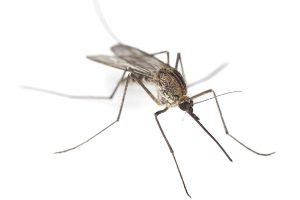
 From the Public Health Director
From the Public Health Director
The Wayland Health Department would like to advise the public that the catch basins in town have been treated with ALTOSID XR Briquettes supplied by the Wayland Board of Health and distributed by the East Middlesex Mosquito Control Project. This treatment is done every year to pro-actively control mosquito larvae. The treated catch basins are marked with a blue paint dot, if you notice untreated catch basin please contact our office at (508)358-3617. The town of Wayland contracts the services of the East Middlesex Mosquito Control Project for mosquito control including larviciding in the spring and catch basin treatments. Our program during mosquito season also includes mosquito trapping, identifying populations and surveillance for diseases and species.
This catch basin treatment is to reduce the number of the culex mosquitoes, which are known to reproduce in a catch basin type of environment (and can carry West Nile Virus). West Nile Virus (WNV) is a mosquito-carried virus that can cause illness ranging from a mild fever to more serious disease like encephalitis or meningitis. WNV is most commonly spread to people through the bite of an infected mosquito.
Culex mosquitoes that develop in water holding containers are the primary vectors of WNV. The culex species are also known as “bridge” vectors that will feed on birds and people. As the summer progresses, birds could be infected with West Nile Virus, and the catch basin treatment decreases the risk of West Nile Virus infecting people.
The Health Department is aware and following the latest information regarding new potentially invasive mosquito species and Arboviral Diseases. As part of the Massachusetts Department of Public Health 2016 Arbovirus Surveillance and Response Plan, MDPH is working with Mosquito Control Projects within the Commonwealth and taking proactive measures to conduct surveillance of mosquito species that are expanding northward, especially Aedes Albopictus. Aedes Albopictus has been implicated in the transmission of arboviruses such as dengue, chikungunya, yellow fever, and Zika, in areas where these viruses circulate. We have met with East Middlesex Mosquito Control Project and have heard first hand from the State Department of Public Health. There is no current evidence that this mosquito species is active or breeding in Wayland or anywhere near Wayland at this time. EMMCP and MDPH have indicated that they do not expect this mosquito in this area anytime in the near future. Establishment in northern latitudes has been limited to date, however, climate change is a factor that does play a role and is hard to predict. In general, this species is more abundant in urban areas, breeding easily in artificial containers, birdbaths, old tires, buckets, clogged gutters, and other standing water sources (similar to some WNV breeding areas). Aedes Ablopictus almost exclusively feed on mammals and are active during daytime hours. We will continue to work collaboratively with the State and EMMCP to monitor the situation and keep the public informed of any new information, including the need for increased surveillance or intervention.
To prevent a yard from becoming a source for Culex mosquitoes and other potentially invasive mosquito species, homeowners should make a thorough inspection of their property and remove, empty, cover or treat any water-holding containers. During the summer, mosquito larvae can complete their development in water within a week. Containers where mosquitoes commonly lay eggs include neglected swimming pools, water in loose fitting pool covers or tarps, unscreened rain barrels, rimless tires, and plastic toys.
What to do in your yard to prevent mosquito breeding, West Nile Virus (WNV) and other Arboviral Diseases:
- Mosquito proof your home and drain standing water in your yard
- Containers where mosquitoes commonly lay eggs include neglected swimming pools, water in loose fitting pool covers or tarps, unscreened rain barrels, rimless tires, and plastic toys, flower pots, trash barrels/containers. Check rain gutters, including all fittings and drains.
- Tires should be disposed of properly or stored inside.
- Rubbish barrels, wheelbarrows and small boats should be covered or stored upside down.
- The water in wading pools and birdbaths should be changed weekly.
- Infrequently used pools should be covered or properly maintained.
- Rainwater collection barrels should be screened, emptied once a week or treated with products containing Bti.
- Some mosquitoes like to come indoors. Keep them outside by having tightly-fitting screens on all of your windows and doors. Fix any holes in screens and screen doors and replace worn weather stripping.
- Keep the grass in your yard cut short and shrubs trimmed.
- Once a week empty and scrub, turn over, cover or throw out any items that hold water.
At this time of year mosquito populations are on the rise and residents should take precautions to avoid mosquito bites.
What you should do to avoid mosquito bites
- Be aware of peak mosquito hours- The hours from dusk to dawn are peak biting times for many mosquitoes. Mosquitoes are more active in damp, shady areas, during cloudy humid days, and at night. Consider rescheduling outdoor activities that occur during evening or early morning. Also, take extra care to use repellent and protective clothing.
- There are some emerging mosquito species that are out and active during the day. Be sure to protect yourself and family members during the day also.
- Clothing can help reduce mosquito bites. Although it may be difficult to do when it’s hot, wearing long-sleeves, long pants and socks when outdoors will help keep mosquitoes away from your skin.
- Apply insect repellent when you go outdoors. Use a repellent with DEET (N, N-diethyl-m-toluamide), permethrin, picaridin (KBR 3023), IR3535 (3-[N-butyl-N-acetyl]-aminopropionic acid) or oil of lemon eucalyptus [p-menthane 3, 8-diol (PMD)], always use any repellent by reading and following instructions on the label of whatever product you are using.
- DEET products should not be used on infants under two months of age and should be used in concentration of 30% or less on older children.
- CDC has recently listed Oil of lemon eucalyptus as providing protection against mosquitoes, however, it should not be used on children under three years of age.
- Permethrin products are intended for use on items such as clothing, shoes, bed nets and camping gear and should not be applied to the skin.
- Cover up the arms and legs of children playing outdoors. Baby carriages and playpens should be covered with mosquito netting.
- Protect pets and horses from mosquito bites.
- Always follow the instructions on the label for any repellent. More information on choosing and using repellents safely is listed below.
For further information on WNV or EEE, log onto:
- The Massachusetts Department of Public Health web site at: www.mass.gov/dph/wnv
- The US Centers for Disease Control and Prevention: http://www.cdc.gov/Features/stopmosquitoes/index.html.
If residents have any questions about mosquitoes or how to control them: the East Middlesex Mosquito Control Project can be reached at: https://sudbury.ma.us/emmcp/
Choosing and using repellents safely:
- http://www.fda.gov/Drugs/EmergencyPreparedness/ucm085277.htm
- http://www.cdc.gov/westnile/faq/repellent.html
The National Pesticide Information Center (NPIC) toll free at 1-800-858-7378 or online at http://npic.orst.edu/index.html. If you can’t go online contact MDPH at (617)983-6800 for a hard copy of the fact sheet.
MDPH 2016 Arbovirus Surveillance and Response Plan: http://www.mass.gov/eea/agencies/agr/pesticides/mosquito/arbovirus-response-plans.html
Julia Junghanns, R.S., C.H.O.
Director of Public Health
06/24/16










